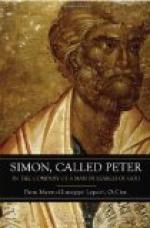The A.C.G. glanced at a paper before him, and rose. He apologised for omitting to mention it before, but H.Q. thought it would be subverse of all discipline if, let us say, privates should be allowed to get up and argue with the officers who might have addressed them. They all knew what might be said in the heat of argument. Also, if he might venture to say so, some of their lecturers, though primed with the right lecture, might not be such experts that they could answer every question, and plainly failure to satisfy a questioner might be disastrous. But questions could be written and replies given at the next lecture. He thought, smiling, that some of them would perhaps find that convenient.
The M.P. leaned back in his chair. “Well, sir,” he said, “I’m sorry to be a wet-blanket, but if that is so, the scheme is wrecked from the start. You don’t know the men; I do. They’re not going to line up, like the pupils of Dotheboys Academy, for a spoonful of brimstone and treacle.”
The meeting was slightly scandalised. The chairman, however, rose to the occasion. That, he said, was a matter for H.Q. They were there to do their duty. And, being an able person, he did his. In ten minutes they were formed into study-bands and were pledged to study, with which conclusion the meeting adjourned.
Peter was almost out of the door when he heard his name called, and turning, saw the A.C.G. beckoning him. He went up to the table and shook hands.
“Do you know the Professor?” asked his superior. “Professor, this is Mr. Graham.”
“How do you do?” said the man of science. “You are Graham of Balliol, aren’t you? You read Political Science and Economics a little at Oxford, I think? You ought to be the very man for us, especially as you know how to speak.”
Peter was confused, but, being human, a little flattered. He confessed to the sins enumerated, and waited for more.
“Well,” said the A.C.G., “I’ve sent in your name already, Graham, and they want you to go to Abbeville for a few weeks. A gathering is to be made there of the more promising material, and you are to get down to the work of making a syllabus, and so on. You will meet other officers from all branches of the Service, and it should be interesting and useful. I presume you will be willing to go? Of course it is entirely optional, but I may say that the men who volunteer will not be forgotten.”
“Quite so,” said the Professor. “They will render extremely valuable service. I shall hope to be there part of the time myself.”
Peter thought quickly of a number of things, as one does at such a moment. Some of them were serious things, and some quite frivolous—like Julie. But he could hardly do otherwise than consent. He asked when he should have to go.
“In a few days. You’ll have plenty of time to get ready. I should advise you to write for some books, and begin to read up a little, for I expect you are a bit rusty, like the rest of us. And I shall hope to have you back lecturing in this Army area before long.”




